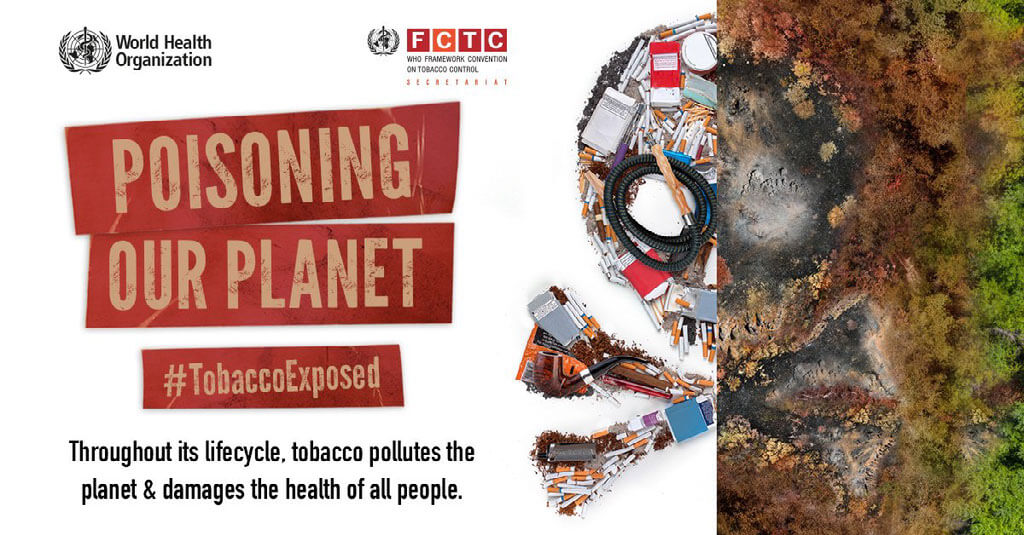Ailsa Rutter OBE, Director of Fresh and Balance said: “Most people know smoking kills – but too rarely do we ever stop think about how tobacco is polluting our world globally and here in the North East where we have a fantastic coastline.
“Cigarette filters are made up of thousands of tiny plastic particles. One single filter puts plastic into the marine environment, while cigarette filters also contain a cocktail of harmful chemical ingredients including arsenic, lead and nicotine that pollute our soil, waterways and seas, harming wildlife.
“It is one more reason to quit smoking and to make tobacco companies pay for the pollution they cause.”
She added: “Tobacco companies make billions of pounds around the world in profits and focus production in the developing world, causing deforestation and using vital land which could be used to grow food and creating sickness and illness among workers. Tobacco companies are increasingly trying to “greenwash” their reputation and products by marketing themselves as environmentally friendly and we should not believe a word of it.
“We are calling now on the Government to carry through its promise for a Smokefree 2030. Fewer people smoking will not only reduce the impact on our communities and healthcare but also on our environment and the burden of litter on local authorities.”
Dr Richard Hixson is a Consultant Anaesthetist and co-founder of Healthcare Ocean – a network from healthcare, marine science, environmental and public health, commercial shipping and active living aimed at ensuring ocean health is considered within healthcare.
He said: “Every hospital sees the terrible impact of smoking in our patient and healthcare systems. But too rarely do we consider the impact on the environment.
“We think of it as just a plant but in fact tobacco is full of toxic chemicals. Tobacco farmers in the developing world suffer from sickness and illness when cultivating it. It then causes cancerous mutations and attacks every part of the body for those who smoke it.
“The number of cigarette butts in the ocean and the toxic chemicals which seep into their surroundings have major consequences for marine life in the area. Studies have shown that even small quantities of cigarette butts in ocean water can be fatal to fish and marine organisms.”
Andrew Riley, a North East surfer who is also a regional representative for Surfers Against Sewage, said: “The fact is that cigarette butt waste is a huge contributor to marine litter – we pick up thousands of cigarette butts off the beaches of the North East at local beach clean events. We found that cigarette butts made up 48% of all of the unbranded plastic pollution found during our 2021 Brand Audit.
“Unfortunately, cigarette butts all too often find their way to the coastline through drains or are stubbed out directly in the sand and pollute the water. You can see by putting a cigarette butt into a bucket of water how quickly it will turn brown, sticky and would pollute any marine life in there.
“There needs to be more public information and measures which ensure people can dispose of butts correctly but ultimately producers must be made responsible for their packaging waste.”
Councillor Ernest Gibson, Lead Member for Transport and Neighbourhoods for South Tyneside Council, said: “Smoking not only destroys people’s lives, it is also wreaking havoc on our environment.
Cigarette butts make up a large proportion of litter on our streets and beaches. They are unsightly, blight the beauty of our beautiful Borough and pose a real threat to wildlife and marine life.
“Given the pollution these items cause to our waterways and oceans, we would encourage people to dispose of them in the bins provided – or even better, quit smoking to improve your own health and reduce the negative impact on the environment.”
Andrew Russell, Professor of Medical Anthropology and Degree Director for the Global and Planetary Health MSc at Durham University, and Associate Member of Fuse, the Centre for Translational Research in Public Health, said: “Tobacco is the source of the bulk of street litter in the North East of England, and the plastics and other toxins in cigarette butts can leach out into the water supply, harming fish and other aquatic species. It also causes deforestation, both for its industrial-scale cultivation and to provide wood for the curing process.
“Tobacco is a hungry crop – it absorbs heavy metals such as lead, cadmium and mercury from the soil along with the nutrients it needs to grow. That’s before you consider the chemical fertilisers and pesticides that are administered to the growing of plants, often days before they are harvested. These all contribute to the 7,000 chemicals that are found both in cigarettes and the tobacco that goes into roll your own pouches.”
Professor Anil Namdeo, Professor of Air Quality Management at Northumbria University, said: “Millions of cigarette butts are dumped into the environment every day causing irreversible damage to our ecosystems; they leach nicotine and many toxic components into water bodies and soil, before turning into microplastics which has long-term health consequences.
“Cigarette butts are small and often get unnoticed, but they are actually one of the most abundant forms of plastic pollution in the world. Cigarette filters (plastic part of butts) can take up to 10 years to completely degrade, with the chemicals they release staying in the environment many years after the life of the cigarette butt. The time has come to ban the use of plastic filters for the sake of the health of our planet.”
About filters (4)
Cigarette butts, which filter tobacco smoke, became popular in the 1950s when the link with lung cancer arose. (4)
They were promoted by tobacco companies as a safer form of smoking despite filters doing nothing to reduce the lethal risk of smoking. (4)
Cigarette filters contain a cocktail of harmful chemical ingredients including arsenic, lead and nicotine that pollute our waterways. One cigarette butt left to soak in water for 96 hours will release enough toxins to kill half of the salt or fresh water fish that are exposed to it. (4)
Meanwhile the toxins contained in the tobacco residue seriously endanger the animals that ingest them too, often proving fatal. Birds and small animals swallow the butts after mistaking them for food, resulting in poisoning, malnutrition and death. (4)
Cigarette filters are made of a plastic called cellulose acetate. When tossed into the environment, they dump not only that plastic, but also the nicotine, heavy metals, and many other chemicals they’ve absorbed into the surrounding environment. (5)
References
References:
[1] Action on Smoking and Health local Ready Reckoner tool https://ash.org.uk/ash-local-toolkit/ash-ready-reckoner-2022/
[3] Cigarette butts that contain plastic should be banned to protect the environment
Total sample size was 13,088 adults. Fieldwork was undertaken between 16th – 21st February 2022 by YouGov Plc. The survey was carried out online. The figures have been weighted and are representative of all UK adults (aged 18+)
[4] https://ash.org.uk/media-and-news/blog/tobacco-polluted-waterways-marine-death/
[5] https://www.nationalgeographic.com/environment/article/cigarettes-story-of-plastic

